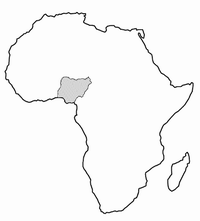Nigeria’s political mess will keep oil prices higher than ever
It may seem at first sight that the reasons for the oil prices to grow on the world markets are obvious. They include the ongoing increase of demand on the part of developing countries, China and India first and foremost, the continuing war in Iraq and the Iranian nuclear crisis. However, there is another factor which makes oil prices climb higher and higher. It goes about the uneasy situation in Nigeria.

The state of political affairs in Africa’s most populated country has never been stable from the moment when Nigeria obtained sovereignty and became independent from Great Britain. The country was suffering from inter-tribal wars and conflicts between Muslims and Christians.
The military dictatorship that was set up in the country after the end of the British colonial ruling also failed to establish law and order in a large country. The oil business could only add more instability to the list of the above-mentioned problems.
Nigeria’s oil deposits are located in the delta of Niger, the home to a large and bellicose tribe called Ijaw. The tribe’s leaders claim their rights to own quite a big part of the oil profits. The military authorities of the country stand firmly against such an intention of the tribe: the illegal extraction and sales of fuel has become a lucrative business for them.
The governmental troops of Nigeria are waging war against the Movement for the Emancipation of the Niger Delta (MEND). The army and the police use brutal measures in their struggle when they burn Ijaw’s whole villages to the ground for intimidation. The company Royal Dutch Shell, which owns most of the local oil business, suffers the largest losses because of the war.
Rebels attack oil pipelines, tankers and take company’s employees hostage. The shipments of Nigerian oil have dropped by 20 percent since the beginning of the year because of the acts of sabotage. It is worthy of note that Nigeria is included in the top ten list of the world's largest oil suppliers.
Apparently, the Nigerian administration has decided to take extreme measures to settle the problem with Ijaw rebels. The troops cannot destroy them that is why the government decided to make certain concessions which could help solve another highly important problem for the country.
According to the current Constitution of Nigeria, the president is entitled to stay at power for not more than two terms. Nigerian civil activists and foreign experts were expecting to witness the first-ever demonstration of the democratic power in the country during next year’s presidential election.
However, the dream of democracy went up in smoke when it became known that incumbent President Olusegun Obasanjo, whose second term in the office is drawing closer to its end, has developed a passion for his position. The president quickly summoned a constitutional assembly to specify the rules for prolonging presidential terms in democratic countries. There are two variants pending: either a possibility of the third term or a new constitution.
To win the reputation of a democratic politician and obtain the support of the bellicose Ijaw tribe, the Nigerian president suggested an increase of the oil profit interest for the tribe from 13 to 25 percent. However, as soon as the intention of concessions was announced, Muslim tribes of Nigeria’s north expressed their protests with violent attacks against governmental forces and Christians.
There is not even a glimmer of hope for Nigeria to come to the all-national consensus. Even if the war in Iraq ends and Iran gives its nuclear program up, the oil prices will not go down. There are too many people in Nigeria who want to make fortunes of their country’s natural wealth.
Politcom
Translated by Dmitry Sudakov
Discuss this article on Pravda.Ru English Forum
Subscribe to Pravda.Ru Telegram channel, Facebook, RSS!





